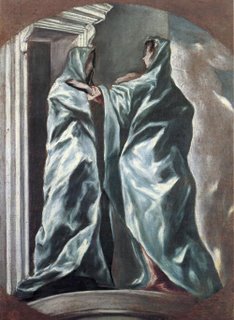MY LIFE WITH THE SAINTSby James Martin, SJ
An elderly Jesuit who had spent many years in "the missions" smiled slyly when I mentioned the last rationale.
"You know," he said, "part of coming to know the international Society is discovering that Jesuits from other countries can be just as much of a pain in the ass as the American ones!"
In my six years as a Catholic I have heard one consistent thing about the Jesuits which is accurately echoed by the excerpt above. They always seemed to be the progressive trouble makers in any story, unless there was a stalwart traditional Catholic Jesuit in which case he was the target of the other trouble making Jesuits. More often than not when I had personal encounters and
arguments spirited discussions about Catholic doctrine with other much more progressive people they would cite being taught by Jesuits to "question everything" as their authority. I found this just plain annoying when I had struggled my way through many questions of my own to get precisely to the traditional Catholicism that they had been handed on a platter and seemed to be spurning. None of this added up to making me very open to the way that Jesuits practiced the Faith.
Of course, the Jesuits did have those aforementioned stalwart traditionals that I could admire. They had staunch supporter
Karen Hall who I have admired for some time so I felt I could trust her judgment. I even have come across
blogging Jesuits who seemed like pretty good guys. However, this really did not sway my overall judgment of cautious observation and keeping an arms length from anyone who seemed too swayed by this group with dangerous tendencies.
Then I began reading this book and it literally and seemingly effortlessly brought me back to a place with God that I had been floundering trying to reach on my own.
In a way my floundering was brought on by too much information. Reading around St. Blog's one will see various devotions to different orders and their own individualized sorts of prayer and living. These would be written about with such affection that it seemed only natural to give them a try. After some time I discovered that none of these served me very well. Not only that, but somehow I had forgotten how to pray in the way that I used to when it was so effortless and fruitful. Thus began a period of that "floundering," of trying to remember what it was that I used to do to see God in everything and to pray without worrying about the mechanics.
Worse still was the fact that without any motivation I really was caring less and less if I prayed at all. Oh, I knew that was the way back to God and that personal relationship that I should be trying to nurture. However, with so many other things to attract my attention, not least of all this blog, it grew harder and harder to carve out that private, personal time. Added to this was the fact that, once I had accepted God's existence, I always had seen evidence of Him reaching out to me through all the encounters of my day and the things in my life. However, I had read several cautions about this sort of faith and trusting too much to our imaginations and so had been pulling back from that also. In short, I didn't know what to think or how to connect any more.
Then, one of
my very best friends generously surprised me with some books from my Amazon wish list and included My Life with the Saints.
(If you're not reading her blog then you're missing some of the most sincere and insightful writing around.)The initial interest that made me include this book on my wish list had waned and honestly I began reading it mostly because the other book she sent was a much more challenging looking read. However, I soon became caught up in Martin's excellent story telling. He wove the saints' stories around his own progress through answering a call to the priesthood and the personal challenges it entailed. I will vouch for his skill in communicating enthusiasm by telling you that I actually wrote one of Thomas Merton's books on my "to read" list after reading the chapter about Merton's life. I have always thought Merton was quite a whiner and this was the first account that made me interested in trying one of his books beside The Seven Storey Mountain which I loathed.
(Please don't tell me all the reasons I am wrong about Merton ... I honestly believe that he has a lot of value for all his devotees. We can't all like everyone and I venture to guess that there are saints I love who many would not like.)Where the personal aspect in this book came in, however, was when Martin began writing about Ignatius of Loyola and explaining the precepts of Jesuit prayer and theology.
In an Ignatian contemplation we attempt to place ourselves in a particular scene, often from the Gospels. In the story of the Nativity, for example, Ignatius asks us to imagine ourselves with Mary and Joseph on their way to Bethlehem: "to see with the sight of the imagination the road from Nazareth to Bethlehem, considering the length and breadth, and whether the road is level or through valleys and hills; likewise looking at the place or the cave of the Nativity, how large, how small, how low, how high, and how it was prepared."
I don't know how to express what a sense of homecoming and joy I felt at reading this. It was how I had prayed from the beginning, imagining how the dew on the grass felt when Mary arose from traveling overnight on the caravan to Elizabeth's, how the sunshine would have hit both of them warmly as they embraced at the Visitation. This was
right. This was
me. It was cemented by Martin telling how he had been unable to get into using his imagination in this way.
"Isn't it all just in my head?" I asked. "Won't I just make the people in my fantasy do what I want them to do?"
"Not necessarily," he said.
I sat there, confused.
"Let me ask you something," David said. "Do you believe that God gave you your imagination?"
"Sure," I said.
"Don't you think that God could use your imaginations to draw you closer to him in prayer?"
Yes! And Amen!
* Though in the back of my mind I was finding it tremendously ironic that the order whose spirituality seemed to speak to me most was one that I distrusted. But that is in line with my experience also. Not only do I know much less that I usually think but God often is making a joke out of it at the same time. Which came home again just a couple of pages later.
Theologians often describe Ignatian spirituality as "incarnational." In other words, while it recognizes the transcendence of God, it is also grounded in the real-life experiences of people living out their daily lives.
It is a spirituality that reminds us that God speaks to us through prayer -- but also through our emotions, our minds, and our bodies. God can communicate through sexual intimacy, romantic love, and friendship. God can be found in Scripture and in the sacraments. God can show his love through your sister, your coworker, your spouse, your next-door neighbor, a teacher, a priest, a stranger, or a homeless person. Finding God in all things. And all people.
And through prompting a loving friend to give a book that leads someone back to the path she has wandered far from when she has lost her way. Just the way I experienced this morning and have recognized since God began calling me to him. Gosh darn it ... I think I have a Jesuit soul. For all the reasons I mentioned above, that ain't easy to admit, y'all!
For the first time in I don't know how long I was actually excited about prayer. I couldn't wait to get back to my "mind's eye" realizations, through God speaking to me through Bible flips. Just in case, I didn't get the point, today's
morning psalm in Magnificat was one that Third Day had made into one of my
very favorite songs, one that is on practically every Godmix playlist I make.
To you, O Lord, I lift my soul
In you, O God, I place my trust
Do not let me be put to shame
Nor let my enemies triumph over me
My hope is you
Show me your ways
Guide me in Truth
In all my days
My hope is you
I am, O Lord, filled with your love
You are, O God, my salvation
Guard my life and rescue me
My broken spirit shouts
My mended heart cries out...
Topping it off, with this song ringing through my head, I turned to the reading from Hebrews which spoke both to my feelings and to this book about saints which brought me to that point. It was to me that final push to point out that I was back on track.
Faith is the realization of what is hoped for and evidence of things not seen. Because of it the ancients were well attested.
Therefore, since we are surrounded by so great a cloud of witnesses, let us rid ourselves of every burden and sin that clings to us 2 and persevere in running the race that lies before us.
Hebrews 11:1-2; 12:1
Of course, this is much more a personal testimony than a book review. I am not yet done but have had my eyes opened wide. Most likely that will not happen for most people reading this book. However, I can promise you a well told tale of Jim Martin's life and faith so far, always surrounded by that "cloud of witnesses" who watch, applaud, and help all of us on our way to our ultimate goal. You will find saints and people who are saintly but not yet accorded that spot on the calendar by the Church (such as Mother Teresa). You will find an inspirational story to help remind all of us that our searching is not in vain. If you are very, very lucky, you will find a nugget directed right at you that will help get you on track and turned in the direction you need to go.
*UpdatedI occasionally have been surprised by my own imagination enough to realize that God uses it to get your attention. From the time that I was idly wondering whether I was making something up or whether a thought came from God and had, "YOU SHOULD KNOW MY VOICE BY NOW!" sternly thunder through my stunned mind ... to the time that I was imagining myself on the hillside listening to the Beatitudes when meditating on the Luminous Mysteries and was startled to suddenly see in my mind's eye Jesus looking over at me and saying, "Come little sister" and patting the ground next to him so that I would learn more about the Beatitudes that I found so boring and uninspiring. These are things that it never occurred to me to invent ...
Tags: Christianity











